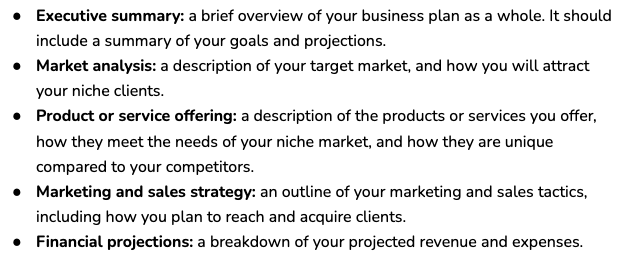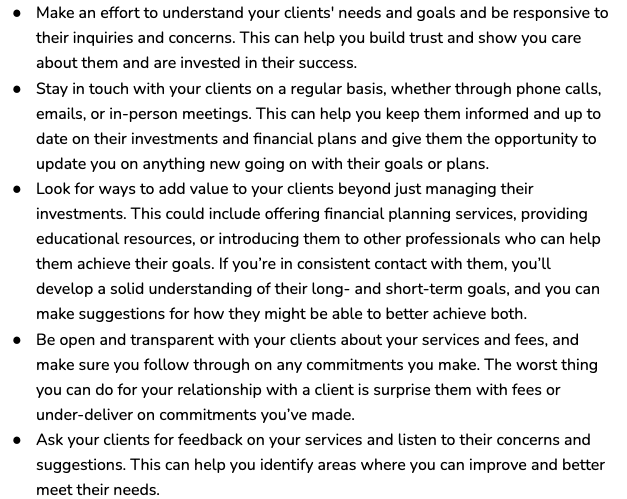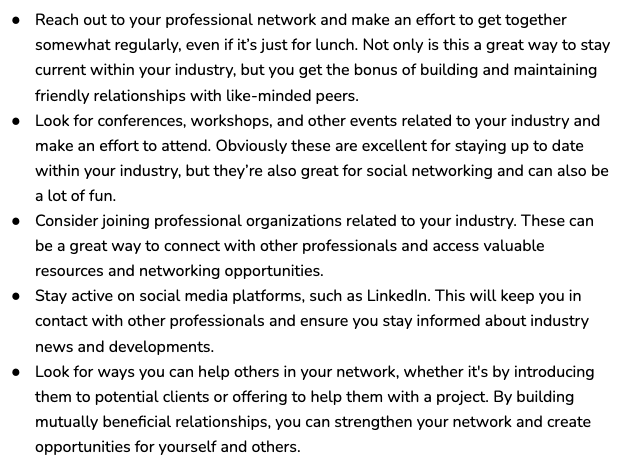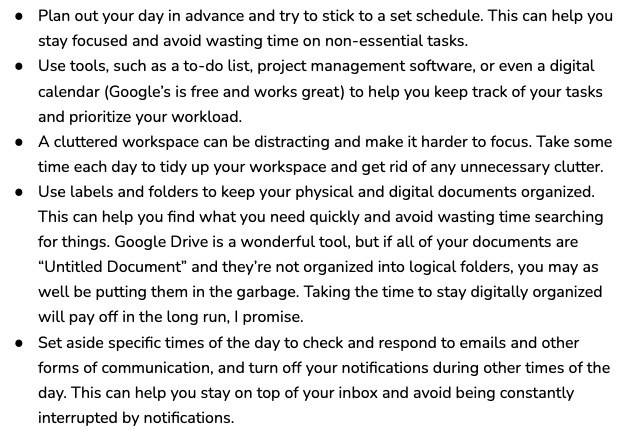Ah, the new year: full of potential and possibilities. Everyone wants to start their year off with a positive outlook, but too often these mindsets are short lived as reality crashes down around us mid-January. It doesn’t have to be that way.
There are a few ways financial advisors can start the new year strong, and keep the positivity flowing well past Martin Luther King Jr. Day. Here are just a few of our recommendations:
1. Set goals
Identify specific and achievable goals you want to accomplish in the new year. These could be related to your business, your clients, or your personal development.
When crafting goals, you want them to be SMART: Specific, Measurable, Attainable, Relevant, and Time-bound. Lots of folks set goals each new year and fail to achieve them because they don’t follow these guidelines.
It’s also a great idea to put your goals in writing. This will not only help clarify your thinking and make the goals feel more real and tangible, but it will also give you an artifact you can revisit to hold yourself accountable for following through.
We also recommend having a mix of short-term and long-term goals or, at the very least, breaking your long-term goals into smaller, more actionable steps. This will allow you to celebrate small successes while still making important progress towards larger milestones.
Unfortunately, simply making goals isn’t enough to make success happen. You should regularly review your goals and track your progress towards achieving them. This will not only keep you motivated as you’re able to visualize the progress you’re making, but also allow you to make adjustments as needed. It sure would be nice if our first plans all worked out perfectly, but usually that’s not how things shake out. You’re going to need to adapt your expectations and goals to the realities of life, which is totally okay — circumstances change, and, as you work, you’ll learn more about what is and isn't possible. It's okay to adjust your goals as needed as long as you are still working towards your overall objectives.
2. Review your progress:
Take some time to reflect on your performance in the past year and identify areas where you can improve. This can help you focus your efforts and prioritize your goals for the new year.
A good place to start is to figure out how often you want to review your progress and stick to a schedule. Put it in your calendar so you don’t forget, and keep notes so you can review them later. This could be weekly, monthly, or quarterly, depending on your goals, circumstances, and how often you can feasibly take the time to do this.
Before you evaluate yourself, you should identify the specific metrics or indicators that you will use to measure your progress towards your goals. These could be financial metrics, such as revenue or profit, or non-financial metrics, such as the number of clients you've acquired or the number of new products you've launched.
You can’t just do all this planning in your head: you should be using some sort of tool, like a spreadsheet or journal, to track your progress over time. This will allow you to see how far you've come, identify any trends or patterns in your successes and misses, and compare these trends year to year.
Once you have all of this data in front of you, take time to think about what has been working well and what challenges you have faced. This can help you identify areas where you can improve and make adjustments as needed. It’s also important to recognize if there were any external factors beyond your control (like, I don’t know, a global pandemic) that may have impacted your progress. You don’t want to be beating yourself up over factors you have no control over.
Finally, don't forget to celebrate your successes along the way! Recognizing your progress will help you stay motivated and focused on your goals.
3. Review your business plan:
Make sure your business plan is up to date and reflects your current goals and priorities. If you don't have a business plan, now is a good time to create one. A business plan should outline your business strategy, goals, and financial projections. Here are the key components of a business plan:

4. Review your client list:
Take stock of your current clients and identify opportunities to deepen your relationships with them. Consider reaching out to clients who you have not heard from in a while to see how you can help them. Showing you care about your clients is a great way to build and maintain relationships so they remain your clients. Here are a few excellent ways to do just that:

By building strong relationships with your clients, you can help them feel more confident in your ability to help them achieve their financial goals, which will make them more invested in their work with you.
5. Connect with your network:
Creating, maintaining, and staying connected with a network of professional peers and/or colleagues is an important part of ensuring you are able to continue providing excellent service to your clients. You wouldn’t want to go to a doctor who hasn’t learned anything new in 5 years, and your clients won’t want to work with a similarly out-of-date financial advisor. Here are some easy steps you can take to make sure you stay up to date:

6. Get organized:
Make sure you have systems in place to manage your time and stay on top of your workload. This can help you be more productive and efficient, which will allow you to serve your clients better. Here’s a couple simple organizational tricks you can use to keep your desk — and brain — uncluttered:

By staying organized, you can be more productive and efficient, which will allow you to better serve your clients and achieve your goals.
7. Create good habits:
Creating good habits is vital to your success because they can help you be more productive, achieve your goals, and lead a healthier and happier life. Habits are the fuel that make the previous tips work.
When you turn a task or behavior into a habit, you are more likely to do it consistently, which can help you make steady progress towards your goals.
Good habits, such as being organized and planning ahead, can save you time and help you be more efficient. This can free up time for you to focus on more important tasks such as servicing your clients and make progress towards your goals.
Being healthy can make you more productive. Good habits, such as exercising regularly and eating a healthy diet, can improve your physical and mental health, which can help you perform at your best and be more successful.
Overall, habits are vital to success because they can help you be more consistent, efficient, healthy, and positive, which can set the stage for you to achieve your goals.






-1.png)


